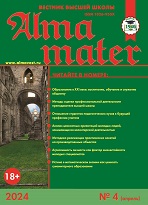UDC 159.9+331.5"202"
https://doi.org/10.20339/AM.06-21.091
M.V. Prokhorova is Cand. Sci. (Psychology), Ass. Prof.; V.S. Kravchenko is Cand. Sci. (Economy), Ass. Prof.; A.E. Barankina is Master Student; and O.S. Shamina is Master Student. All at Lobachevsky State University of Nizhny Novgorod
Revealed are dominant work motives of Russian employees in the second decade of the 21st century. The authors are based on a two-modal concept of work motivation, the foundations of which were laid by F. Herzberg, highlighting positive and negative labor motivation as independent structures. It was elicited that the core of positive labor motivation is the following: high wages, interesting work, stable and reliable work. In the structure of negative labor motivation, the dominant motive is low wages, the second and third levels are formed by unstable and unreliable work, poor working environment. The study, which was attended by 759 respondents, had being conducted from 2012 to 2020. The questionnaire “Ranking of positive and negative work motives” (RPOM) was applied to collect data. Their processing was carried out using methods of descriptive statistics, non-parametric U test, Mann-Whitney, as well as qualitative analysis.
Key words: work motivation, hierarchy of motives, positive motives, negative motives, motives core, Russian employees.
References
1. Zdravomyslov, A.G., Yadov, V.A. Man and his work in the USSR and after. Moscow: Aspect Press, 2003.485 p.
2. Bessokirnaya, G.P. Have the motives of workers’ labor changed in post-Soviet Russia? Sociological research. 2017. No. 1. P. 94–105.
3. Leontiev, A.N. Activity, consciousness, personality. Moscow: Politizdat, 1977. 304 p.
4. Aseev, V.G. Behavior Motivation in the personality development. Moscow: Mysl’, 1976. 158 p.
5. Magomed-Eminov, M.Sh. Achievement Motivation: Structure and Mechanisms: аbstr. Diss. … Candidate of Psychological Sciences: 19.00.01. Moscow, 1987. 343 p.
6. Prokhorova, M.V., Mazanova, A.E. Questionnarie Method of Estimation of Positive and Negative Motives of Labor Activity. Vestnik VEGU. 2016. No. 5 (85). P. 87–101.
7. Herzberg, F., Mosner, B., Sniderman, B.B. Motivation to work. Moscow: Vershina, 2007. 400 p.
8. Maslow, A. Motivation and personality. St. Petersburg: Peter, 2011. 352 p.
9. Zamfir, C. Work Satisfaction. Sociologist’s Opinion. Moscow: Politizdat, 1983. 142 p.
10. Russia in figures 2020. Official publication. URL: https://rosstat.gov.ru/storage/mediabank/GOyirKPV/Rus_2020.pdf (accessed on: 03.26.2021).
11. Prices in Russia. URL: https://rosstat.gov.ru/folder/210/document/13239 (accessed on: 03.26.2021).
12. Robescu, O., Iancu, A.G. The effects of motivation on Employees performance in organizations. Valahian Journal of Economic Studies. 2016. Vol. 7. No. 2. P. 49–56.
13. Deci, E.L., Ryan, R., Koestner, R. A Meta-Analytic Review of Experiments Examing the Effects of Extrinsic Rewards or Intrinsic Motivation. Psychological Bulletin. 1999. Vol. 125. No. 6. P. 627–668.
14. Prokhorova, M.V., Bashuk, E.N. The Work Motivation Structure at the Stage of Intensive Business Growth. Vestnik VEGU. 2014. Vol. 74. No. 6. P. 76–83.
15. Prokhorova, M.V., Baranova, A.A. The role of monetary motivation in the needs sphere of pharmaceutical business employees. Bryansk State University Herald. 2014. No. 1. P. 247–252.
16. Prokhorova, M.V. Sense-Making Work Motivation of Women and Men. Izvestiia of Saratov University. New episode. Series: Philosophy, Psychology, Pedagogy. 2016. Vol. 16. No. 3. P. 321–325.
17. Ritchie S., Martin, P. Motivation Management. Moscow: Unity-Dana, 2009. 399 p.











.png)






